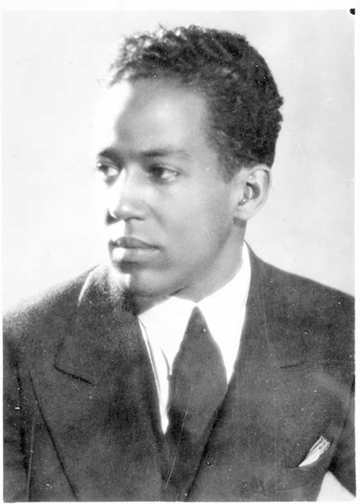Langston Hughes
James Mercer Langston Hughes, (February 1, 1902 – May 22, 1967) was an American poet, novelist, playwright, short story writer, and columnist. He was one of the earliest innovators of the new literary art form jazz poetry. Hughes is best-known for his work during the Harlem Renaissance. He is also best known for what he wrote about the Harlem Renaissance, "Harlem was in vogue."
Hughes' life and work were enormously influential during the Harlem Renaissance of the 1920s alongside those of his contemporaries, Zora Neale Hurston, Wallace Thurman, Claude McKay, Countee Cullen, Richard Bruce Nugent, and Aaron Douglas, who, collectively (with the exception of McKay), created the short-lived magazine Fire!! Devoted to Younger Negro Artists.
In his work he confronted racial stereotypes, protested social conditions, and expanded African America’s image of itself; a “people’s poet” who sought to reeducate both audience and artist by lifting the theory of the black aesthetic into reality. Moreover, Hughes stressed the importance of a racial consciousness and cultural nationalism devoid of self-hate that united people of African descent and Africa across the globe and encouraged pride in their own diverse black folk culture and black aesthetic.
Langston Hughes was one of the few black writers of any consequence to champion racial consciousness as a source of inspiration for black artists. His African-American race consciousness and cultural nationalism would influence many foreign black writers, such as Jacques Roumain, Nicolás Guillén, Léopold Sédar Senghor, and Aimé Césaire. With Senghor and Césaire and other French-speaking writers of Africa and of African descent from the Caribbean like René Maran from Martinique and Léon Damas from French Guiana in South America, the works of Hughes helped to inspire the concept that became the Négritude movement in France where a radical black self-examination was emphasized in the face of European colonialism.
Langston Hughes was not only a role model for his calls for black racial pride instead of assimilation, but the most important technical influence in his emphasis on folk and jazz rhythms as the basis of his poetry of racial pride. In 1930, his first novel Not Without Laughter won the Harmon Gold Medal for literature. Hughes's first collection of short stories came in 1934 with The Ways of White Folks. He received a Guggenheim Fellowship in 1935.
Langston Hughes died of complications from prostate cancer in May 22, 1967, in New York. In his memory, his residence at 20 East 127th Street in Harlem, New York City, has been given landmark status by the New York City Preservation Commission, and East 127th Street has been renamed "Langston Hughes Place."
Here is another one of my favorite poems from Hughes:
What happens to a dream deferred?
Does it dry up
like a raisin in the sun?
Or fester like a sore--
And then run?
Does it stink like rotten meat?
Or crust and sugar over--
like a syrupy sweet?
Maybe it just sags
like a heavy load.
Or does it explode?
Check out a montage Nike created for the 2008 Beijing Olympics:
A Selected Bibliography
Poetry
Ask Your Mama: 12 Moods for Jazz (1961)
Collected Poems of Langston Hughes (1994)
Dear Lovely Death (1931)
Fields of Wonder (1947)
Fine Clothes to the Jew (1927)
Freedom's Plow (1943)
Montage of a Dream Deferred (1951)
One-Way Ticket (1949)
Scottsboro Limited (1932)
Selected Poems (1959)
Shakespeare in Harlem (1942)
The Dream Keeper and Other Poems (1932)
The Panther and the Lash: Poems of Our Times (1967)
The Weary Blues (1926)
Prose
Good Morning, Revolution: Uncollected Social Protest Writings by Langston Hughes (1973)
I Wonder as I Wander (1956)
Laughing to Keep From Crying (1952)
Not Without Laughter (1930)
Remember Me to Harlem: The Letters of Langston Hughes and Carl Van Vechten, 1925-1964 (2001)
Simple Speaks His Mind (1950)
Simple Stakes a Claim (1957)
Simple Takes a Wife (1953)
Simple's Uncle Sam (1965)
Something in Common and Other Stories (1963)
Tambourines to Glory (1958)
The Arna Bontemps-Langston Hughes Letters (1980)
The Big Sea (1940)
The Langston Hughes Reader (1958)
The Ways of White Folks (1934)
Drama
Black Nativity (1961)
Collected Works of Langston Hughes, vol. 5: The Plays to 1942: Mulatto to The Sun Do Move (2000)
Don't You Want to Be Free? (1938)
Five Plays by Langston Hughes (1963)
Little Ham (1935)
Mulatto (1935)
Mule Bone (1930)
Simply Heavenly (1957)
Soul Gone Home (1937)
The Political Plays of Langston Hughes (2000)
Poetry in Translation
Cuba Libre (1948)
Gypsy Ballads (1951)
Selected Poems of Gabriela Mistral (1957)
Translation
Masters of the Dew (1947)
For his contributions to African American culture and his inspirational literary works, Talented Generation salutes Langston Hughes!




No comments:
Post a Comment